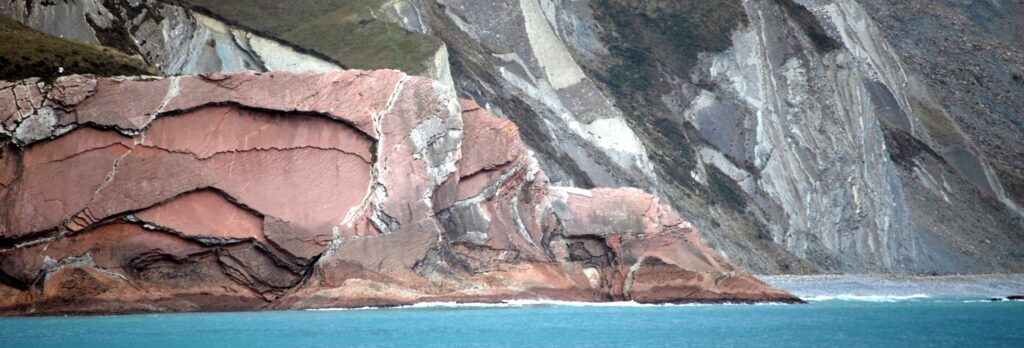
Gaia and Philosophy
International Symposium
1-3 December, Donostia – San Sebastián
Basque Country University (UPV/EHU)
Organised by IAS-Research – Outonomy project
→Registration form
Program
Updated 5/11/22
Thursday 1 December
| 16-18h | IAS Research Seminar Bruce Clarke: “Planetary intelligence: a Gaian critique” |
Sala de Juntas, HEFA (Education, Philosophy and Anthropology) Faculty,
UPV/EHU University of the Basque Country, Av. Tolosa 70, Donostia
The session will be available to follow online.
Friday 2 December
| 10h30 – 11h15 | Bruce Clarke presenting Writing Gaia: The Scientific Correspondence of James Lovelock and Lynn Margulis, Cambridge University Press, 2022. Q&A |
| 11h15 – 12h | Sébastien Dutreuil “Scientific hypothesis, research program, or philosophy of nature?” (online) Q&A |
| 12h-12h45 | Audronė Žukauskaitė “Gaia and Organism-Oriented Ontology” Q&A |
| 13h | Lunch |
| 14h30-15h15 | Sergio Rubin “Taking the Gaia hypothesis at face value: From Earth organization and functional climatology to Gaian cognition” Q&A |
| 15h15-16h00 | Gillian Barker “Geofunctions: A pragmatic approach to functions, norms, and purposes at planetary scale” (online) Q&A |
| 16h00-17h | Debate |
Sala de Juntas, HEFA (Education, Philosophy and Anthropology) Faculty, UPV/EHU University of the Basque Country, Av. Tolosa 70, Donostia
The session will be available to follow online.
| 19h | Evening Lecture (external event) “Gaian Being and the Anthropocene” Bruce Clarke, presented by Arantza Etxeberria. |
Koldo Mitxelena cultural centre, Urdaneta Kalea, 9, Donostia
Saturday
| 10h30-13h | Guided field trip with Asier Hilario, Scientific Director of the Basque Coast Unesco Global Geopark “Life and climate evolution on Earth’s history as reflected in the Zumaia Flysch” |
Meeting point 9h30 Lugaritz station in Donosti – San Sebastián

Participants
Gillian Barker is Visiting Research Professor, Department of History and Philosophy of Science, University of Pittsburgh. Her recent research has focused on complex adaptive systems at different levels of organization, and how science can best grapple with their distinctive features in investigating human immunology, ecological and psychological resilience, evolutionary dynamics, and what evolved human nature can teach us about the prospects for social change. Her current research applies similar ideas to the problems of understanding and managing the interconnected global-scale processes upon which human societies depend: what I call “geo-functions.” This research connects recent developments in climate science, ecology, agricultural science, and hydrology, and involves extensive collaboration across academic disciplines and with non-academic expert practitioners.
Bruce Clarke is Paul Whitfield Horn Distinguished Professor of Literature and Science in the Department of English at Texas Tech University, and the 2019 Blumberg/NASA Chair in Astrobiology at the Library of Congress. His research focuses on systems theory, narrative theory, and ecology. He is the author of Gaian Systems: Lynn Margulis, Neocybernetics, and the End of the Anthropocene and co-editor of the forthcoming Writing Gaia: The Scientific Correspondence of James Lovelock and Lynn Margulis.
Sébastien Dutreuil is CNRS researcher at Centre Gilles Gaston Granger in Marseille. His PhD Thesis is “Gaïa : hypothèse, programme de recherche pour le système Terre, ou philosophie de la nature”. He has co-authored the paper “Life on Earth is hard to spot”, with Timothy M. Lenton and Bruno Latour, and is co-editor of the forthcoming Writing Gaia: The Scientific Correspondence of James Lovelock and Lynn Margulis.
Arantza Etxeberria is Associate Professor at the University of the Basque Country UPV/EHU, and a researcher at IAS Research Centre. Recently she was the co-PI on a Project on “Inter-identities: Ontological and normative aspects of biological, cognitive and social individuality”. She has written articles on conceptualizations of biological reproduction and pregnancy, on relational accounts of organisms and environments, and on the work on these topics by philosopher Georges Canguilhem. Her main research interests are on individuality and autonomy in biology and medicine, biological organization and its evolution from the perspective of evo devo, and classifications in science and society.
Asier Hilario is the Scientific director of the Basque Coast Geopark and Project Manager of GEO.5 Geological Heritage.
Sergio Rubin is researcher at the Georges Lemaître Centre for Earth and Climate Research, Earth and Life Institute of the Université catholique de Louvain, Belgium and member of the editorial board of Cybernetics & Human Knowing. A Journal of Second Order Cybernetics, Autopoiesis & Cybersemiotics. His interest revolves around the multiple theoretical-biological approaches to central problems of biology such as protein folding, synthetic biology, origin of life, exo-biology, and the Gaia hypothesis. Among other publications, he has written several papers on Gaia from an organizational second-order perspective inspired by relational biology and systemic biology of cognition, such as “Future climates: Markov blankets and active inference in the biosphere” with Karl Friston, “Taking the Gaia hypothesis at face value”, “Earth’s Complexity Is Non-Computable: The Limits of Scaling Laws, Nonlinearity and Chaos”, and “Beyond planetary-scale feedback self-regulation: Gaia as an autopoietic system”.
Audronė Žukauskaitė is Chief Researcher at the Lithuanian Culture Research Institute. Her recent publications include the monographs Gilles Deleuze and Felix Guattari’s Philosophy: The Logic of Multiplicity (in Lithuanian, 2011), and From Biopolitics to Biophilosophy (in Lithuanian, 2016). She also co-edited (with S. E. Wilmer) Interrogating Antigone in Postmodern Philosophy and Criticism (2010); Deleuze and Beckett (Palgrave Macmillan, 2015), Resisting Biopolitics: Philosophical, Political and Performative Strategies (Routledge, 2016; 2018), and Life in the Posthuman Condition: Critical Responses to the Anthropocene (Edinburgh UP, 2023). Her latest monograph Organism-Oriented Ontology is forthcoming from Edinburgh University Press. Her research interests include contemporary philosophy, Deleuze and Guattari’s philosophy, biopolitics, biophilosophy, and posthumanism.


El programa actualizado puede consultarse aquÍ: https://outonomy.net/2022/10/25/gaia-and-philosophy-international-seminar/